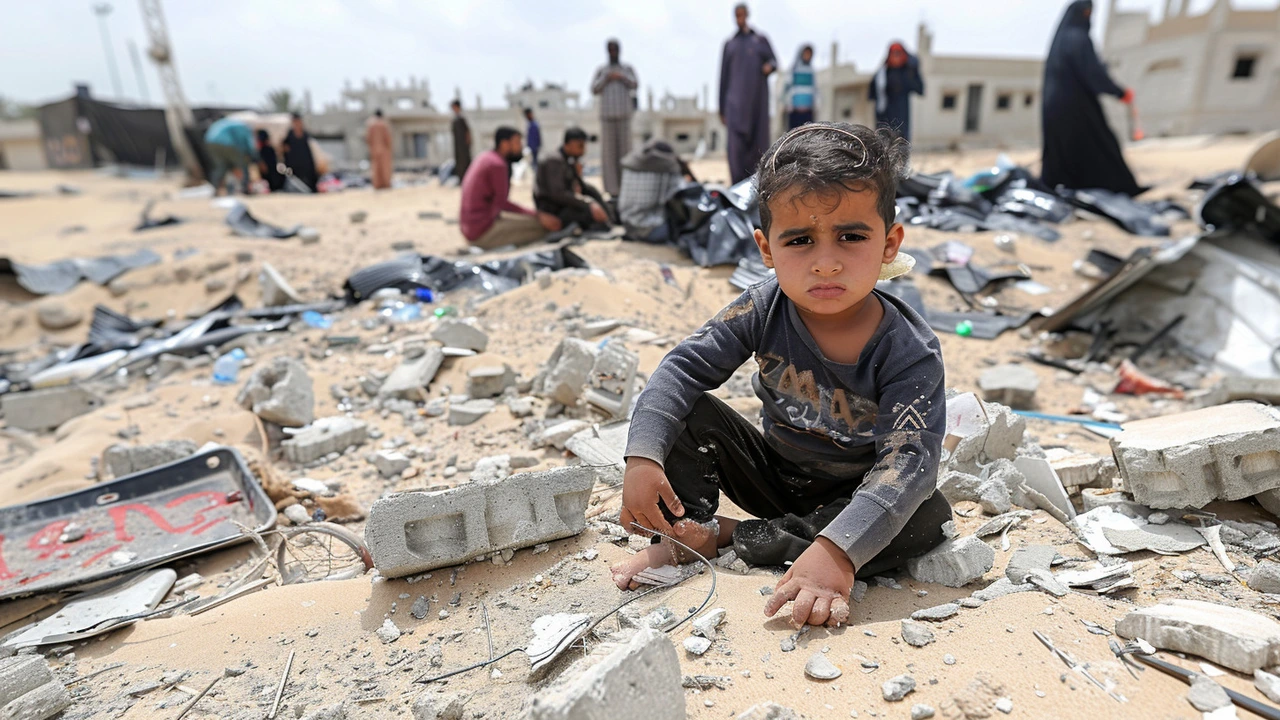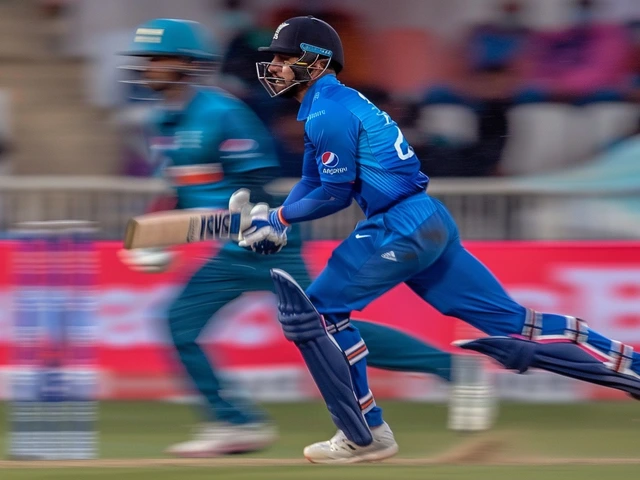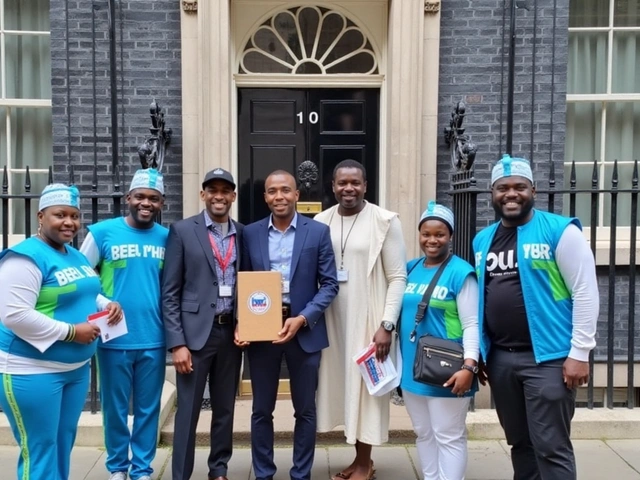Global Outrage Over Israeli Strikes in Rafah: Calls for Ceasefire and Adherence to International Law
The recent Israeli military strike in Rafah has ignited global condemnation, with many world leaders expressing profound sorrow and calling for an immediate end to hostilities. The attack, which resulted in the deaths of more than 45 individuals, including innocent children, has been described as a tragic error by Israeli Prime Minister Benjamin Netanyahu. International leaders and communities are now demanding a ceasefire and adherence to international law to protect civilians and prevent such tragedies from recurring.
French President Emmanuel Macron was among the first to express his outrage, taking to the social media platform X to voice his concerns. Macron condemned the attack, describing it as a deplorable act that underlines the dangerous situation in Rafah. He argued there are no safe areas in the region for Palestinian civilians, urging immediate steps towards a ceasefire and the upholding of international law. Macron's statements resonated strongly within the international community, which is united in its call for an end to violence.
Italian Defense Minister Guido Crosetto also joined the chorus of condemnation, highlighting the necessity for the international community to intervene and protect Palestinian lives. Crosetto emphasized that the ongoing violence cannot be justified any longer, and bold actions are needed to ensure safety and peace. He called on Israel to reconsider its approach and to collaborate with international partners in finding peaceful solutions.
The U.S. response has been noteworthy for its nuanced stance. While acknowledging the heart-wrenching images and reports emerging from Rafah, U.S. officials stopped short of demanding an outright cessation of military operations. The American government reiterated Israel's right to target Hamas militants, who have been actively launching attacks on Israeli civilians. However, this stance has been met with criticism, as many believe it fails to adequately address the humanitarian crisis faced by Palestinian civilians.
During a press conference, Netanyahu described the strike as a tragic error and expressed deep remorse for the loss of innocent lives. He stated that despite concerted efforts to avoid collateral damage, the operation went tragically wrong. He reiterated Israel's commitment to minimizing civilian casualties in military engagements but emphasized the complex nature of combating terrorist threats within densely populated areas like Rafah.
The International Court of Justice (ICJ) has previously intervened, urging Israel to halt its offensive due to the escalating humanitarian crisis. The court's recommendations, however, lack enforceability, leaving it up to the international community to press for compliance. This incident underscores the critical need for an enforceable mechanism to ensure the protection of civilians and respect for international human rights laws.
Humanitarian Concerns and the Way Forward
The humanitarian consequences of the strike have been devastating. Medical facilities in Rafah are overwhelmed, grappling with an influx of casualties and a shortage of necessary supplies. International aid organizations are calling for immediate assistance to alleviate the suffering and provide essential services to the affected populations. The global community has a responsibility to step in, offering aid and advocating for the rights and safety of Palestinian civilians.
This incident has also reignited discussions around the broader Israeli-Palestinian conflict. There is an increasing call for a reevaluation of strategies to achieve long-term peace and stability in the region. Many experts argue that sustainable peace can only be achieved through dialogue and diplomatic efforts rather than military action. The path to resolution must involve addressing underlying issues such as territorial disputes, political recognition, and the right of return for Palestinian refugees.
The voices of the affected communities are paramount in these discussions. Palestinian civilians in Rafah and beyond have long endured the hardships of conflict, and their perspectives must guide international efforts towards peace. An inclusive process that prioritizes the needs and rights of all stakeholders is essential to breaking the cycle of violence and building a future where both Israelis and Palestinians can coexist peacefully.
International Reactions and Diplomatic Efforts
Following the Rafah incident, several countries have called for emergency discussions at international forums, including the United Nations. There is a growing consensus that a unified approach is needed to address the conflict and prevent further escalation. Diplomatic channels are being utilized to mediate between the conflicting parties, urging calm and a return to negotiations.
European Union (EU) representatives have also expressed their alarm, calling for immediate action to protect civilians and resume peace talks. The EU is emphasizing the importance of adhering to international laws and conventions, urging both sides to exercise restraint and pursue non-violent solutions. EU officials are working with other international bodies to coordinate a robust response that addresses both the immediate humanitarian needs and the long-term peace process.
The role of regional powers cannot be overlooked. Neighboring countries in the Middle East are actively engaging in diplomatic efforts to de-escalate tensions. There is a recognized need for a regional approach, leveraging the influence of key players to foster dialogue and support conflict resolution initiatives. Regional cooperation is seen as crucial in achieving a sustainable peace framework.
This incident serves as a stark reminder of the fragile nature of peace and the urgent need for comprehensive conflict resolution strategies. The international community's response will be critical in shaping the future of the Israeli-Palestinian conflict. Efforts must be guided by a commitment to human rights, justice, and the ultimate goal of a peaceful coexistence for all people in the region.
In conclusion, the global condemnation of the Rafah strike is a call to action for the world to come together and address the root causes of the conflict. The tragic loss of life underscores the urgent need for a ceasefire and adherence to international law. Only through concerted diplomatic efforts and a dedication to human rights can lasting peace and stability be achieved in the region.






Ciara Russell-Baker
May 28, 2024 AT 17:23This whole thing is just typical propaganda, full of lies and bias.
Aaron Samarita
June 7, 2024 AT 03:40Honestly, the spectacle they’re putting on is nothing short of theatrical tragedy. First, we get the headline about a "tragic error" and the media rushes to paint Israel as some benevolent protector. Then, they sprinkle in a few tear‑jerking photos of children and suddenly every world leader is a saint. Let’s not forget the endless loop of blame‑shifting that follows – a classic move to keep the conversation superficial. Behind the curtain, it’s a calculated effort to distract from the deeper geopolitical motives. The U.S. is all too eager to toe the line, all while tossing around vague "right to self‑defense" rhetoric. Meanwhile, the ground realities are reduced to statistics and sound bites. You can almost hear the echo chamber chant, "Casualties are inevitable, but we must support the ally." The real victims are the civilians, whose lives are turned into political pawns. And yet, the same voices that call for restraint are the ones that fund the next round of arms. The irony is palpable – a call for peace that fuels the very weapons of war. Let’s be real: any peace that doesn’t address the occupation will just be a temporary ceasefire. The existing narrative conveniently omits the history of displacement and systematic oppression. It’s a pattern: crisis, media frenzy, diplomatic platitudes, and then back to business as usual. The world pretends to care, but the underlying structures remain untouched. In the end, the only thing that changes is the headline, not the suffering on the ground.
Daisy Pimentel
June 16, 2024 AT 13:58When we discuss the sanctity of human life, we must confront the moral abyss that allows such "errors" to be brushed off as collateral. The very notion that innocent children are expendable reflects a deeper ethical decay. It's not merely about strategy; it's about the fundamental values we claim to uphold. If peace were truly a pursuit, it would begin with an uncompromising respect for civilian life. The rhetoric of "tragic mistake" becomes a hollow refrain when the infrastructure of occupation persists unapologetically. A true cessation of hostilities must be rooted in justice, not temporary pauses.
Ellen Ross
June 26, 2024 AT 00:15While your moral high‑ground is noted, it's essential to recognize that any discourse lacking precise geopolitical context is mere sophistry. One cannot simply parade platitudes without addressing the intricate tapestry of regional power dynamics, historical grievances, and the undeniable reality of militant entrenchment within civilian populations. The argument that "all lives matter" is a reductive veneer that obscures the strategic imperatives at play. Moreover, invoking abstract ethics without acknowledging the tangible threats faced by security apparatuses offers a distorted narrative, bordering on intellectual pretension. The reality is far more nuanced, and our analysis must reflect that complexity, not succumb to emotive oversimplification.
Fabian Rademacher
July 5, 2024 AT 10:32People don't realize the true motives behind the bombings – it's all part of a larger agenda to control the narrative and suppress dissent. The media and governments are in cahoots, feeding us selective facts while hiding the real story. The real question is who benefits from this endless cycle of violence?
Terrell Mack
July 14, 2024 AT 20:49Take a breath. It's a messy situation, but both sides are feeling the weight. Maybe focusing on small, tangible humanitarian steps can help ease the immediate suffering while we keep pushing for longer‑term dialogue.
Dawn Waller
July 24, 2024 AT 07:06Wow!!! So here we are again, the same old drama, the same old "humanitarian crisis" narrative-yeah, right. It's as if the world can't get past the headline ticker and actually dig into the root causes. But sure, let’s keep throwing feel‑good emojis while the actual policy decisions sit on a dusty shelf!!!
Grace Melville
August 2, 2024 AT 17:23Stay safe, everyone. 🙏 Helping agencies are on the ground, and any support you can give makes a difference. 🌍
Ashlynn Barbery
August 12, 2024 AT 03:40Thank you for highlighting the humanitarian aspect. It is crucial that we continue to mobilize resources and coordinate with reputable organizations to ensure aid reaches those in need. Your dedication to fostering constructive dialogue is appreciated.
Sarah Graham
August 21, 2024 AT 13:58It’s important we keep the conversation respectful and inclusive. Offering support to peace initiatives can help bridge divides, and every voice matters in these discussions.
Jauregui Genoveva
August 31, 2024 AT 00:15Honestly, everyone pretends to care about civilians while ignoring the bigger picture. 🤦♀️ It's just another example of performative activism.
naman sharma
September 9, 2024 AT 10:32One must consider that the orchestrated media narratives are designed to manipulate public perception, diverting attention from covert operations that sustain the status quo.
Quinten Squires
September 18, 2024 AT 20:49Look, the facts are simple. The whole conflict is a symptom of deeper systemic issues that no one wants to address. If we keep ignoring the root cause then the cycle repeats. The media feeds us the same story over and over, ignoring the nuance.
Tyler Manning
September 28, 2024 AT 04:20It’s evident that the narrative being pushed serves a particular nationalistic agenda, sidelining genuine concerns for civilian welfare while advancing geopolitical interests.
james patel
September 28, 2024 AT 04:20From a policy analysis perspective, the current diplomatic framework lacks enforceable mechanisms to ensure compliance with international humanitarian law, necessitating a reevaluation of multilateral engagement strategies.